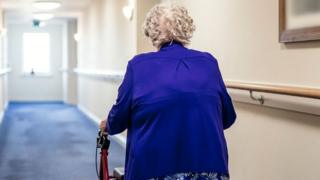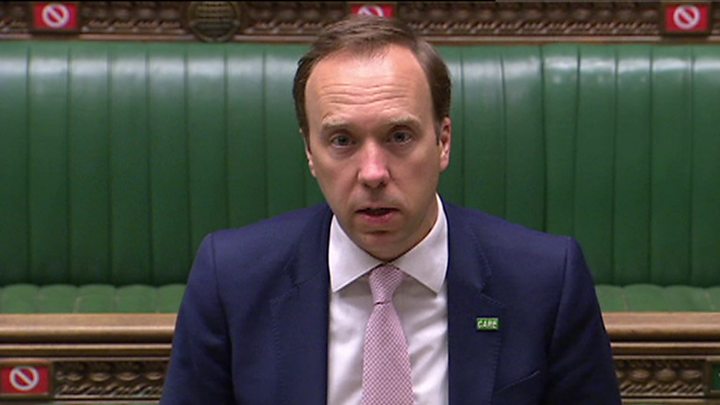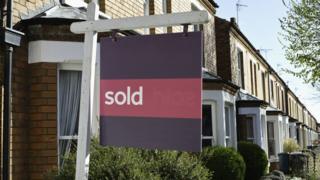
 Image copyright
Image copyright
Getty Images
The head of the organisation which represents care homes in England has strongly criticised the government’s handling of the coronavirus outbreak.
Professor Martin Green, of Care England, said people who were most at risk of dying of Covid-19 should have been prioritised from the beginning.
He told MPs there were still problems with testing and PPE in care homes.
Health Secretary Matt Hancock said the care sector had received unprecedented levels of support during the crisis.
It comes as an industry body has said care homes in England were planning their response to the coronavirus pandemic “with their hands tied” because data about outbreaks in the sector were not published until the end of April.
Meanwhile, the latest figures suggest more than 11,600 people have died from coronavirus in UK care homes since the start of the pandemic.
But for the second week running, the review of death certificates by statisticians showed the number of new deaths had fallen.
Figures released on Tuesday show the number of people to have died after testing positive for Covid-19 has risen by 174 in England, 29 in Scotland, 17 in Wales and seven in Northern Ireland.
The Department of Health has recorded another 545 deaths of people in the UK following a positive coronavirus test, bringing the total number to have died to 35,341.
Giving evidence to the Health and Social Care Committee, Prof Green said pandemic planning had been completely inadequate and the government had focused on the NHS while discharging infected patients into care homes.
He told MPs that despite promises from ministers, there were still huge issues with testing, with results lost and staff waiting eight to 10 days to find out if they have coronavirus.
Answering an urgent question in the House of Commons, Mr Hancock insisted people were sent to care homes when community transmission rates were low.
Prof Green told MPs there would need to be a “forensic examination” in the future to prevent a crisis in care homes from happening again.
“We should have been focusing on care homes from the start of this pandemic,” he said.
“What we saw at the start was a focus on the NHS which meant care homes often had their medical support from the NHS withdrawn.
“We also had the disruption of our supply chains for PPE [personal protective equipment].
“We also saw people being discharged from hospital when we didn’t have the testing regime up and running.
“So despite what’s been said, there were cases of people who either didn’t have a Covid-19 status, or who were symptomatic, who were discharged into care homes.”
He added: “Given that care homes are full of people with underlying health conditions, I think we should’ve looked at focusing on where the people at most risk were, rather than thinking about a particular organisation.”
Prof Green said a lot of care homes had not had the right set-up for isolating patients coming from hospitals, while other countries used separate quarantine facilities for infected patients.
And he said some test results for staff or residents in care homes had been lost, while others waited so long that it was unclear if they were still valid.
He insisted that PPE across care homes was still inadequate and called for testing “two or three times a week” to get on top of the virus.
However, he said there were indications of a downward trend in cases, telling MPs: “I think we are probably at the top of the curve and hopefully heading downwards.”
James Bullion from the Association of Directors of Adult Social Services in England also gave evidence, and said both the lack of PPE and testing still remain a problem.
“The care workforce is 1.6 million. We are nowhere near the level of testing that is required,” he said.
‘Too slow’
Mr Hancock has claimed ministers have done everything they can to protect care homes.
He said a “protective ring” has been thrown around care homes, adding that nearly two-thirds of care homes had not seen outbreaks.
In the Commons on Tuesday, shadow social care minister Liz Kendall accused government ministers of being “too slow” to tackle the spread of coronavirus in care homes.
She asked Mr Hancock to explain why guidance saying care homes were very unlikely to be infected was not withdrawn until 12 March.

Media playback is unsupported on your device
Mr Hancock said the guidance to care homes that was in place until 13 March “was in place whilst community transmission was low and said it would be updated as soon as transmission went broader and that’s exactly what we did”.
In early March, the government’s chief medical adviser Professor Chris Whitty warned MPs it was “highly likely” community transmission of coronavirus in the UK was already happening.
On discharging hospital patients to care homes, Mr Hancock said it was “important to remember that hospital can be a dangerous place for people”.
He stood by the principle of discharging patients to care homes, saying it was “appropriate” and “safer” in many cases.
“What’s important is that infection control procedures are in place in that care home, and those infection control procedures were put in place at the start of this crisis and have been strengthened.”
- LOUIS THEROUX: The 15 songs getting him through lockdown
- FAKE-AWAY: The best fast food recipes you can make at home
Testing row
It comes as Downing Street has suggested it accepts ministers bear responsibility for the decisions in the government’s coronavirus response – amid a row over who was responsible for the move to stop community testing for coronavirus in March.
No 10 said the prime minister is “hugely grateful for the hard work and expertise of the UK’s world leading scientists”, after Work and Pensions Secretary Therese Coffey appeared to deflect blame to scientists.
Earlier, she told Sky News that “if the science was wrong, advice at the time was wrong”.
The prime minister’s spokesman did not specify, when asked, who took the decision, but said: “Scientists advise, ministers take decisions, that’s how government works.”
He added that ministers had repeatedly set out the need to increase testing capacity in the UK.
Has your relative or loved one died in a care home after contracting coronavirus? Share your experiences by emailing .
Please include a contact number if you are willing to speak to a BBC journalist.
Source link


